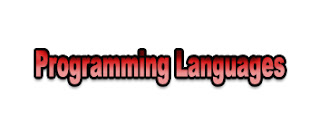 |
| Programming Languages |
In a broad sense, there are two categories of programming languages:
low-level and highlevel.
A low-level language is close to the level of the computer, which means it resembles the numeric machine language of the computer more than the natural language of humans.
The easiest languages for people to learn are high-level languages. They are called “highlevel” because they are closer to the level of human-readability than computer-readability.
 |
| Programming Languages |
Well-Known High-Level Programming Languages
Language | Description
BASIC Beginners All-purpose Symbolic Instruction Code. A general programming
language originally designed to be simple enough for beginners to learn.
C A structured, general-purpose language developed at Bell Laboratories. C offers
both high-level and low-level features.
C++ Based on the C language, C++ offers object-oriented features not found in C. Also
invented at Bell Laboratories.
C# Pronounced “C sharp.” A language invented by Microsoft for developing
applications based on the Microsoft .NET platform.
COBOL Common Business-Oriented Language. A language designed for business
applications.
FORTRAN Formula Translator. A language designed for programming complex
mathematical algorithms.
Java An object-oriented language invented at Sun Microsystems. Java may be used to
develop programs that run over the Internet in a Web browser.
JavaScript A language used to write small programs that run in Web pages. Despite its name,
JavaScript is not related to Java.
Pascal A structured, general-purpose language designed primarily for teaching
programming.
Python A general purpose language created in the early 1990s. It has become popular for
both business and academic applications.
Ruby A general purpose language created in the 1990s. It is becoming increasingly
popular for programs that run on Web servers.
Visual Basic A Microsoft programming language and software development environment that
allows programmers to quickly create Windows-based applications.
C++ is a widely used language because, in addition to the high-level features necessary for writing applications such as payroll systems and inventory programs, it also has many low-level features. C++ is based on the C language, which was invented for purposes such as writing operating systems and compilers. Because C++ evolved from C, it carries all of C’s low-level capabilities with it.
C++ is also popular because of its portability. This means that a C++ program can be written on one type of computer and then run on many other types of systems. This usually requires that the program is recompiled on each type of system, but the program itself may need little or no change.

ConversionConversion EmoticonEmoticon